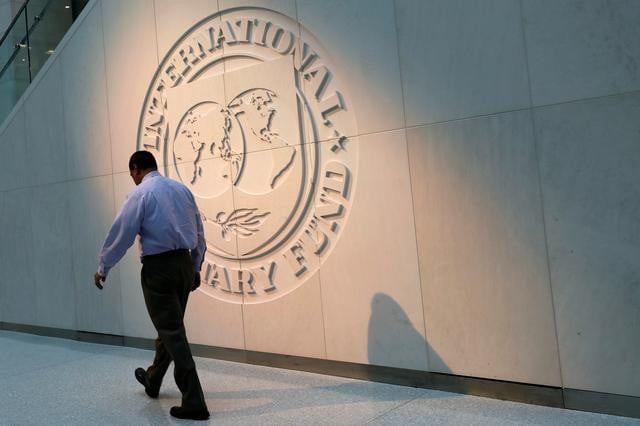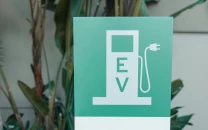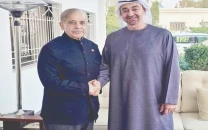Pakistan reaches staff-level agreement with IMF for $1.17bn loan tranche
Fund says Pakistan should stand ready to 'take any additional measures'

The International Monetary Fund (IMF) on Thursday announced a staff-level agreement with Pakistan on the completion of two outstanding programme reviews and increased the total loan size to $7 billion.
The global lender, however, said that Islamabad should stand ready to “take any additional measures”. The IMF statement revealed that against the primary budget surplus target of Rs153 billion or 0.2% of the GDP set in the newly revised budget, the global lender has, in fact, given the 0.4% target.
To achieve this target, the government may either require more revenue measures or will have to slash the expenditure, excluding that on development.
The review of Pakistan’s “anti-corruption institutions, including the National Accountability Bureau [NAB] has also been made part of the programme conditions", according to the IMF statement.
“The IMF team has reached a staff-level agreement with the Pakistani authorities for the conclusion of the combined seventh and eighth reviews of the Extended Fund Facility [EFF]- supported programme,” the statement quoted Nathan Porter, the IMF mission chief to Pakistan, as saying.
Read: Reduction in petroleum prices within 48 hours: Maryam
Announcing the agreement, Finance Minister Miftah Ismail in a tweet posted earlier today thanked "the PM, my fellow ministers, secretaries and especially the finance division for their help and efforts in obtaining this agreement."
Pakistan and IMF have reached an agreement. We will soon receive $1.17b as the combined 7th & 8th tranche. I want to thank the PM, my fellow ministers, secretaries and especially the finance division for their help and efforts in obtaining this agreement. https://t.co/376sCHLc1Y
— Miftah Ismail (@MiftahIsmail) July 14, 2022
Moreover, Prime Minister Shehbaz Sharif also lauded the "Finance & Foreign Office teams led ably by Ministers Miftah Ismail & Bilawal Bhutto for their efforts in getting the IMF program revived."
Congratulations to our Finance & Foreign Office teams led ably by Ministers Miftah Ismail & Bilawal Bhutto for their efforts in getting the IMF program revived. It was a great team work. The Agreement with the Fund has set the stage to bring country out of economic difficulties.
— Shehbaz Sharif (@CMShehbaz) July 14, 2022
He maintained that the revival of the programme will "set the stage to bring [the] country out of economic difficulties."
Total access under the EFF to reach $7bn
The IMF statement mentions that the agreement is subject to approval by the IMF’s Executive Board and once approved by the board about $1.177 billion (SDR 894 million) worth of loan tranche will be released. This will bring the total disbursements under the programme to about $4.2 billion.
Finance Minister Miftah Ismail had, however, hoped to receive $2 billion.
The IMF said that in order to support the programme implementation and meet the higher financing needs in the fiscal year 2022-23, as well as catalyse additional financing, the IMF Board will consider an extension of the EFF until end-June 2023 and augmentation of access by SDR 720 million or $1 billion.
The Fund said that this will bring the total access under the EFF to about $7 billion.
It is pertinent to note here that the agreement was reached only after the nation paid a heavy price in the shape of Rs249 per litre petrol price and Rs277 per litre high-speed diesel cost. The taxes on the salaried class were also significantly increased to convince the global lender to agree on the staff-level agreement.
Nonetheless, Finance Minister Miftah said that all the required actions have been taken and now the IMF board is expected to meet in the third week of August to approve the reviews and revised programme.
The previous government of the Pakistan Tehreek-e-Insaf (PTI) had signed the 39-month EFF in July 2019 aimed at avoiding default on foreign repayment obligations. However, the country remained in turmoil and despite remaining in the IMF programme, its foreign exchange reserves remained thin amid heightened external debt-related vulnerabilities.
Due to faulty EFF programme design, unrealistic targets and lack of political commitment to implement what former premier and PTI chief Imran Khan had himself agreed to, the programme remained suspended for almost two years out of three years.
'Reduce govt's large borrowing needs'
The IMF statement underlined that “steadfast implementation of the FY2023 budget” was a critical element for the continuation of the programme.
“The budget aims to reduce the government’s large borrowing needs by targeting an underlying primary surplus of 0.4% of the GDP, underpinned by current spending restraint and broad revenue mobilization efforts focused particularly on higher-income taxpayers,” according to Nathan Porter.
The primary budget surplus target is double than what the government had announced last month. This may require more measures to achieve the sacrosanct goal. However, a finance ministry official said that the 0.4% of the GDP target was with a fiscal adjuster. Without a fiscal adjuster it was Rs153 billion or 0.2% of the GDP, he added.
Read More: Imran vows to win July 17 by-polls despite rivals ‘enjoying support of umpires'
The IMF has made it clear that Pakistan will protect the “development spending” and fiscal space will be created for expanding social support schemes. It added the provinces have agreed to support the federal government’s efforts to reach the fiscal targets, and Memoranda of Understanding have been signed by each provincial government to this effect.
The IMF said that on the back of weak implementation of the previously agreed plan, the power sector circular debt (CD) flow is expected to grow significantly to about Rs850 billion in the just-ended fiscal year, overshooting the programme targets, threatening the power sector’s viability and leading to frequent power outages.
It added Pakistan was committed to resuming reforms, including, critically, the timely adjustment of power tariffs including the delayed annual rebasing and quarterly adjustments, to improve the situation in the power sector and limit load-shedding.
Similarly, the Fund added that the recent monetary policy increase was necessary and appropriate, and monetary policy will need to be geared towards ensuring that inflation is brought steadily down to the medium-term objective of 5 to 7%.
“Importantly, to enhance monetary policy transmission, the rates of the two major refinancing schemes Export Financing Scheme and Long Term Financing Facility will continue to be linked to the policy rate.
“Greater exchange rate flexibility will help cushion activity and rebuild reserves to more prudent levels,” according to the IMF.
Reducing poverty & corruption
For reducing poverty and strengthening social safety, the IMF said that during the current fiscal year Pakistan has allocated Rs364 billion to BISP to bring nine million families into the BISP safety net, and further extend the cheaper fuel scheme to additional non-BISP, lower-middle class beneficiaries.
The IMF said that in order to ”improve governance and mitigate corruption, the [Pakistani] authorities are establishing a robust electronic asset declaration system and plan to undertake a comprehensive review of the anti-corruption institutions [including NAB] to enhance their effectiveness in investigating and prosecuting corruption cases.”
“Pakistan is at a challenging economic juncture. A difficult external environment combined with procyclical domestic policies fueled domestic demand to unsustainable levels,” according to Porter. He said that the resultant economic overheating led to large fiscal and external deficits in the last fiscal year that contributed to rising inflation, and eroded reserve buffers.
“Steadfast implementation of the outlined policies, underpinning the staff-level agreement for the combined seventh and eighth reviews, will help create the conditions for sustainable and more inclusive growth,” said the IMF.
It added that Pakistani “authorities should nonetheless stand ready to take any additional measures necessary to meet programme objectives, given the elevated uncertainty in the global economy and financial markets."
It is expected that the staff-level agreement would soothe the markets, reduce credit default risks and may help strengthen the rupee. But it will unleash a wave of inflation that already touched a 14-year high of 21.3% in June.
Read Also: Saudi crown prince accepts PM Shehbaz's invitation for visit
The National Assembly has already approved a law to increase the Rs50 per litre petroleum levy on high-speed diesel, petrol, high octane blending component (HOBC), E-10 gasoline, superior kerosene oil and light diesel.
The government has not yet notified the Rs3.50 per unit increase in electricity prices with effect from July but the finance minister said that an understanding has been reached with the IMF about increasing the electricity prices.
The Economic Coordination Committee (ECC) of the cabinet has already approved increasing the electricity tariffs by Rs7.91 per unit in three phases but its final notifications remained pending. The ECC has also approved up to 235% increase in gas prices.
The IMF had asked Pakistan to seek and communicate the cabinet’s nod to further increase the petroleum levy by Rs10 per litre on petrol and Rs5 on diesel from August 1. But finance minister said that only the PM’s approval will be sufficient to increase the prices.


















COMMENTS
Comments are moderated and generally will be posted if they are on-topic and not abusive.
For more information, please see our Comments FAQ